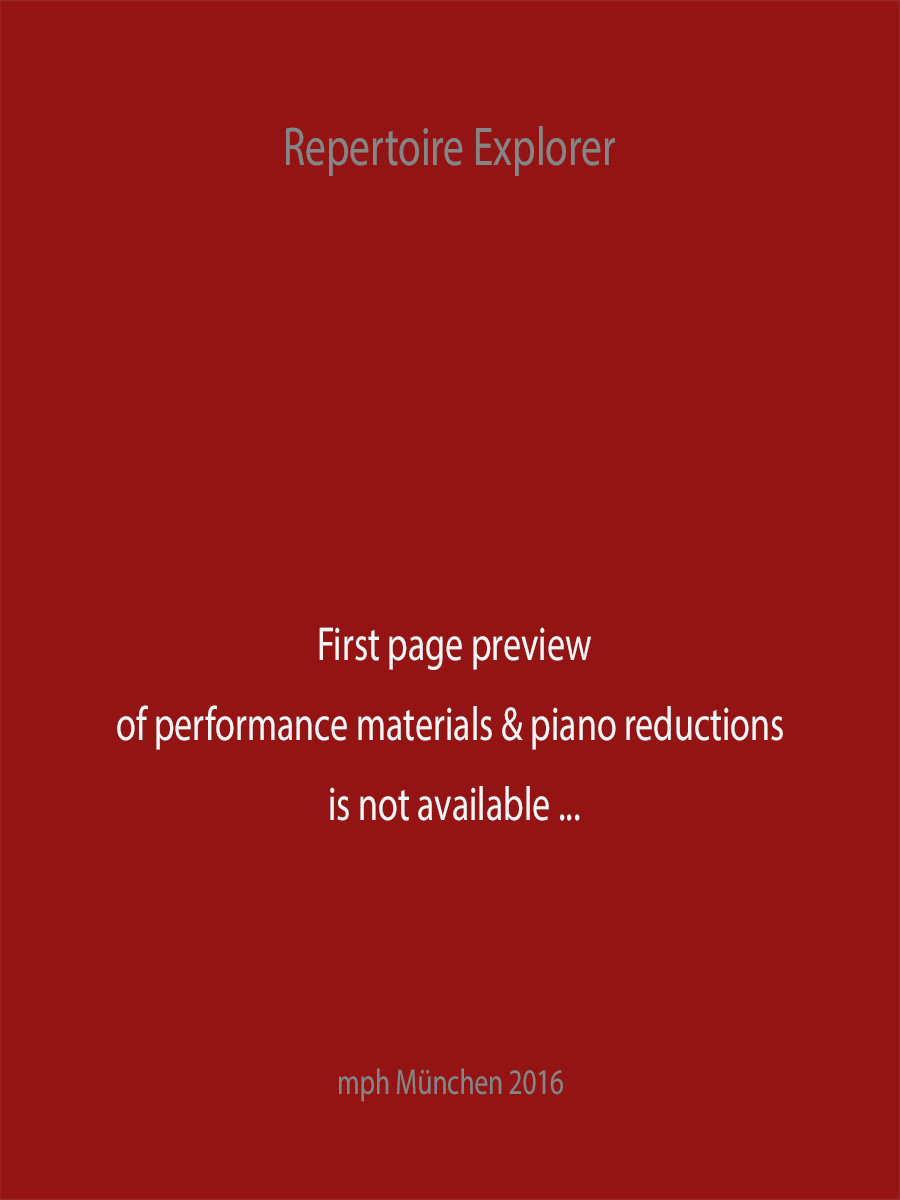Psalm XIII for tenor, mixed chorus and orchestra (Vocal Score / German text)
Liszt, Franz
12,00 €
Liszt, Franz
Psalm XIII for tenor, mixed chorus and orchestra (Vocal Score / German text)
Preface of the full score
In the summer of 1855 Franz Liszt, now firmly ensconced in Weimar as court conductor and intent on reinventing the essence of nineteenth-century composition, interrupted his work on the mighty Dante Symphony and the Prometheus Choruses to write a setting of the 13th Psalm with its well-known cri du coeur: “How long wilt thou forget me, O Lord? for ever? how long wilt thou hide thy face from me?” For Liszt, it was quite obviously a labor of love: “It came to me out of the abundance of my heart,” he later remarked, paraphrasing the famous passage from Matthew 12:34. “King David’s feelings poured out of me in flesh and blood.” The new work was a surprising step for a man then thought to be the incarnation of the secular, if not the diabolical, in musical romanticism, and it clearly presaged his later turn to religiosity and minor monastic orders as “Abbé Liszt” after his departure from Weimar in 1861. Liszt was fully aware that the new work stood out in his oeuvre, and resolved to set aside its first performance for a special occasion: an all-Liszt concert to be given in Berlin under his direction later that year.
In early December 1855 Liszt duly set out by train to Berlin, accompanied by an entourage of camp-followers, among whom was his latest discovery, the fourteen-year-old prodigy Carl Tausig. A large pro-Liszt faction greeted him at the Berlin station, and the usual round of high-level socializing, with Liszt’s unmistakable blend of belle esprit and aristocratic grandezza, was set in motion. The concert itself, given in the Berlin Singakademie on 6 December, was packed to the rafters, with King Friedrich Wilhelm IV, Queen Elisabeth, and other members of the Prussian royal family in attendance to hear Liszt conduct a program of Les Préludes, an Ave Maria for mixed chorus and orchestra, the First Piano Concerto (played by that ardent Lisztian Hans von Bülow), the mighty symphonic poem Tasso, and finally Psalm XIII, in which Liszt, visibly moved, sang along with the tenor part. The audience was, for the most part, thrilled: “After the psalm, which went perfectly, there were several st‘s and szt‘s (the last letters of my name), and these occasioned a roar of bravos.” Liszt then left the hall for a lavish banquet held in his honor at the Arnim Hotel, where he was fêted by three-hundred guests.
Berlin’s critics, however, were not as well-disposed as the audience toward Liszt’s best choral composition to date, and he was forced in retrospect to admit that the concert had been, all in all, a failure (the laurels, he later quipped, were a “salad tossed with thistles”). But Psalm XIII continued to hold a special place in his affections; and when he came to write his will, on 14 September 1860, he added a special codicil in which he enjoined Hans von Bülow to arrange for Psalm XIII, then still in manuscript, to be “published in score with the piano accompaniment at the bottom of each page.” Indeed, when the work was finally issued in print by Kahnt of Leipzig in 1864, with a dedication to Peter Cornelius, it appeared precisely in this unusual format, a hybrid combination of full score and piano-vocal score.
By that time, however, Psalm XIII had undergone a metamorphosis. The piece heard at the Berlin première was not the one that appeared in the Kahnt print: the initial version had called for a soprano and mezzo-soprano in addition to tenor, mixed chorus, and orchestra. Between 1859 and 1863 Liszt reworked the score to its present form, dropping the two women’s parts and leaving behind the second version for tenor, mixed chorus, and orchestra that we know today. By then he had already completed his sacred oratorio The Legend of Saint Elisabeth (1857-62) and was fully immersed in the magnum opus of his sacred music, the oratorio Christus (1862-7), both of which have tended ever since to dwarf the significance of Psalm XIII in his sacred oeuvre. Nevertheless, the psalm setting, after its ill-starred première, enjoyed a perfectly respectable career: the Kahnt edition was frequently reissued in the latter course of the century, and the work also appeared in an English version (1876), a French version (1878), yet another English version (1888, translated by the redoubtable Reverend Troutbeck), and an abridged organ arrangement (1880). In 1975 it was reissued in full score and vocal score (with a new piano reduction) by Editio Musica in Budapest and C. F. Peters in Frankfurt, edited by Márta Papp, and it has latterly been given the honor of a complete transcription for solo piano (Chicago, 1995). Though not particularly well-represented on disc, a remarkable historic recording of Psalm XIII with the Royal Philharmonic Orchestra under Sir Thomas Beecham was recently remastered and reissued on the EMI label.
Bradford Robinson, 2008.
| Score No. | 782b |
|---|---|
| Edition | Repertoire Explorer |
| Genre | Choir/Voice & Orchestra |
| Size | |
| Specifics | |
| Printing | Reprint |
